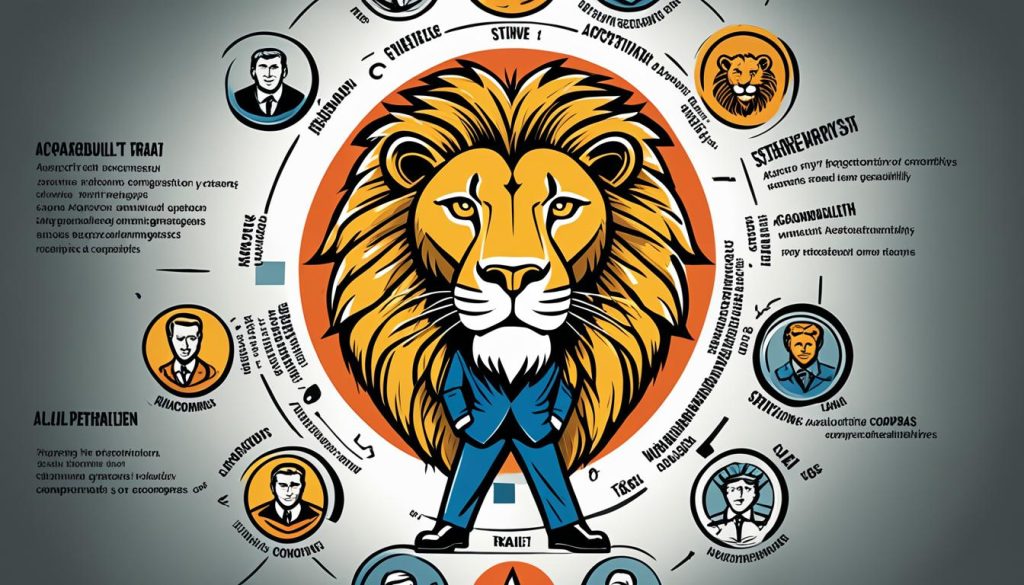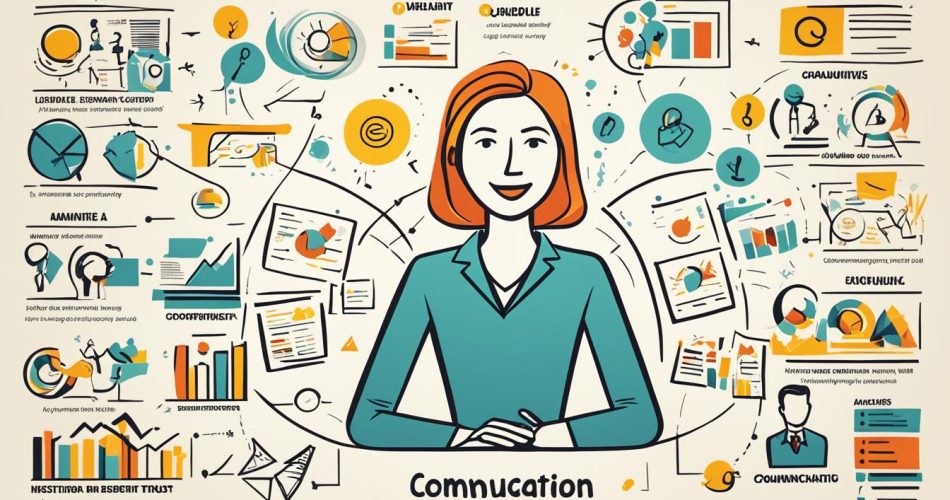As a professional in the business world, I have always been fascinated by the concept of effective leadership. What makes some individuals exceptional leaders, capable of guiding their teams to success, while others struggle to inspire and motivate? This question has led me on a journey of exploration and discovery, seeking to understand the qualities and skills that define an effective leader.
Effective leadership is more than just a title or position; it is a set of traits and behaviors that empower individuals to make a positive impact on their teams and organizations. It involves nurturing the potential of those around them, inspiring trust and confidence, and making smart decisions that propel the collective towards common goals.
Throughout my research and experience, I have come to realize that effective leaders possess a unique combination of qualities. They are self-aware, recognizing their own strengths and weaknesses. They build credibility through consistent actions and honest communication. They excel in relationship building, fostering a culture of collaboration and empowerment. They have a bias for action, taking calculated risks and embracing change. And above all, they lead with humility, understanding that leadership is not about personal glory, but about enabling the success of others.
In this article, I will delve deeper into the qualities that make an effective leader and explore strategies for developing these essential skills. Whether you are a seasoned executive, an aspiring manager, or simply someone interested in understanding effective leadership, this article will provide valuable insights to unlock your leadership potential.
Key Takeaways:
- Effective leadership goes beyond titles and positions, encompassing a range of qualities and skills.
- Self-awareness, credibility, relationship building, bias for action, and humility are key traits of effective leaders.
- Developing leadership requires self-reflection, mentorship, networking, and education.
- Strategies such as adaptability, collaboration, delegation, and innovation are crucial for success.
- Leadership is a journey of growth, inspiration, and transformation.
The Importance of Effective Leadership
Effective leadership plays a critical role in the success and growth of organizations across all sectors. Leaders with strong leadership skills, qualities, and characteristics inspire and motivate their teams to achieve shared goals and objectives. They possess the ability to make well-informed decisions, navigate challenges adeptly, and shape the culture of the organization. Additionally, effective leaders promote inclusivity and diversity within their teams, fostering an environment of collaboration and innovation.
When leaders exhibit effective leadership skills, they create a positive and empowering work environment. They establish clear communication channels, provide guidance and support, and encourage their team members to reach their full potential. By embodying leadership qualities such as integrity, empathy, and resilience, effective leaders gain the respect and trust of their team, enabling them to lead by example.
“Effective leadership is not about asserting authority, but about empowering others to succeed.”
Leadership characteristics such as adaptability, strategic thinking, and openness to new ideas are crucial for navigating the ever-changing business landscape. Effective leaders anticipate and embrace change, using it as an opportunity for growth and innovation. They foster a culture of continuous learning and improvement, encouraging their team members to develop new skills and adapt to evolving challenges.
In summary, effective leadership skills, qualities, and characteristics are essential for driving organizational success. By inspiring and motivating their teams, making informed decisions, and shaping company culture, effective leaders create an environment of collaboration and innovation. Through their leadership, they empower their team members to reach their full potential and achieve extraordinary results.
Qualities of an Effective Leader

Effective leaders possess a wide range of qualities that enable them to drive success and create a positive work environment. These qualities are instrumental in developing effective leadership strategies, enhancing leadership development, and fostering leadership skills development.
1. Self-Awareness
Leaders with self-awareness have a deep understanding of their strengths, weaknesses, values, and emotions. This awareness allows them to make conscious decisions, adapt their approach, and seek personal growth.
2. Credibility
Building credibility is essential for effective leaders. It involves being honest, reliable, and transparent in their actions and communication. Credible leaders gain the trust and respect of their teams, which is vital for collaboration and achieving goals.
3. Relationship Building
Leaders who prioritize relationship building create strong connections with their team members. They actively engage, listen, and provide support, fostering a sense of belonging and loyalty.
4. Bias for Action
Effective leaders have a bias for action. They are proactive, seize opportunities, and are not afraid to make decisions even in uncertain situations. This quality inspires their teams to take initiative and drive results.
5. Humility
A humble leader acknowledges their own limitations, embraces feedback, and values the contributions of others. This humility creates an inclusive and collaborative work environment where everyone feels valued.
6. Empowerment of Team Members
Leaders who empower their team members foster a culture of trust and autonomy. They delegate effectively, offer support and guidance, and encourage individuals to take ownership of their work.
7. Authenticity
Authentic leaders are true to themselves and align their actions with their values. They create an environment where open communication and vulnerability are encouraged, leading to stronger relationships and a shared sense of purpose.
8. Consistency
Consistency is a vital quality for effective leadership. It involves maintaining a stable and reliable approach, ensuring fairness in decision-making, and setting clear expectations for team members.
9. Role Modeling
Leaders who lead by example and embody the behaviors and values they expect from their team members create a powerful impact. They inspire others to emulate their positive qualities and contribute to a culture of excellence.
10. Presence
Leaders with a commanding presence are able to engage and captivate their audience. Whether in a meeting, presentation, or conversation, their presence commands attention and inspires others to listen and follow.
These qualities play a crucial role in effective leadership strategies, driving the development of leadership skills, and creating an environment where teams can excel. By embodying these qualities, leaders can inspire their teams to reach their fullest potential and achieve extraordinary results.
Leadership in Different Contexts
In various contexts, effective leadership entails different traits and qualities. While decision-making, effective communication, and strategic thinking are important in the workplace, empathy, motivation, and adaptability are key in education. In politics and government, integrity, resilience, and charisma are essential for effective leadership.
For instance, in the workplace, leaders must make well-informed decisions that drive the organization toward its goals. Effective communication fosters collaboration, encourages transparency, and builds strong relationships within the team. Moreover, strategic thinking allows leaders to navigate challenges, identify opportunities, and create effective plans for business growth and innovation.
On the other hand, in the field of education, effective leaders must possess empathy, as it enables them to understand the needs and abilities of their students. Motivation is crucial in inspiring and empowering both students and teachers to achieve academic success. Additionally, adaptability ensures leaders can effectively respond and adapt to changes in the educational landscape, such as the integration of new technologies or the implementation of new teaching methodologies.
“The function of education is to teach one to think intensively and to think critically. Intelligence plus character – that is the goal of true education.” – Martin Luther King Jr.
In politics and government, integrity is vital for leaders to gain the trust and confidence of the public. Resilience allows leaders to endure the challenges and pressures of public office while maintaining focus on their vision and goals. Furthermore, charisma enables leaders to effectively communicate their message, inspire others, and rally support for their policies and initiatives.
Leadership in these diverse domains requires a deep understanding of the specific challenges, goals, and dynamics at play. By recognizing the context-specific requirements, leaders can adapt their leadership approach to effectively guide and inspire their teams in each setting.
| Context | Key Traits and Qualities |
|---|---|
| Workplace |
|
| Education |
|
| Politics and Government |
|
Developing Leadership Qualities

Leadership potential can be developed through various methods and experiences. By focusing on self-reflection, mentorship, networking, and education, individuals can enhance their leadership skills and become effective leaders.
Self-Reflection
Self-reflection plays a crucial role in leadership development. It allows leaders to gain self-awareness, understand their strengths and weaknesses, and identify areas for improvement. By reflecting on their actions, decisions, and interactions with others, leaders can continuously strive for personal growth and development.
Mentorship
Mentorship is an invaluable resource for leadership development. Having a mentor provides individuals with guidance, support, and valuable insights from a more experienced leader. Mentors can offer advice, share their own experiences, and challenge mentees to step out of their comfort zones and reach their full potential as leaders.
Networking
Networking is another essential avenue for leadership development. By connecting with other leaders, professionals, and industry experts, individuals can broaden their perspectives and gain exposure to different leadership styles and approaches. Networking allows leaders to learn from others, exchange ideas, and build relationships that can potentially lead to new opportunities and collaborations.
Education
Education plays a transformative role in enhancing leadership skills. By pursuing leadership training programs, workshops, or certifications, individuals can acquire new knowledge, tools, and strategies to effectively lead and inspire others. These educational experiences provide a structured environment for developing leadership skills, learning from experts, and gaining practical insights and techniques.
| Methods for Developing Leadership Qualities | Benefits |
|---|---|
| Self-Reflection | Gaining self-awareness and identifying areas for improvement. |
| Mentorship | Receiving guidance, support, and valuable insights from experienced leaders. |
| Networking | Expanding perspectives, learning from others, and building valuable relationships. |
| Education | Acquiring new knowledge, tools, and strategies for effective leadership. |
Leadership Strategies for Success
Effective leadership requires a combination of skills and strategies that drive success. Leaders who adapt to change, delegate effectively, think strategically, collaborate with their teams, and foster innovation are better equipped to navigate challenges and achieve their goals.
One key strategy for effective leadership is adaptability. Leaders who can quickly adjust their approach and mindset in response to changing circumstances are better prepared to address unexpected challenges. By embracing change and encouraging their teams to do the same, leaders can create a culture of resilience and flexibility.
Delegation is another important strategy that effective leaders employ. By delegating tasks and responsibilities to capable team members, leaders not only alleviate their own workload but also empower their team members to develop new skills and take ownership of their work. This not only promotes growth within the team but also allows leaders to focus on higher-level decision-making and strategic planning.
Strategic thinking is a critical skill for leaders who aim to make informed decisions and guide their organizations towards long-term success. By analyzing data, anticipating future trends, and identifying opportunities, leaders can develop a forward-thinking approach and inspire their teams to achieve strategic goals.
Collaboration is another essential strategy for effective leadership. By fostering an environment in which diverse perspectives are valued and team members are encouraged to share ideas and opinions, leaders can harness the collective intelligence and creativity of their teams. Collaboration not only generates innovative solutions but also enhances team cohesion and engagement.
Innovation is a key driver of success in today’s rapidly evolving business landscape. Effective leaders understand the importance of encouraging creativity and embracing new ideas. By fostering a culture of innovation, leaders empower their teams to explore new possibilities, challenge the status quo, and drive continuous improvement.
By leveraging these strategies – adaptability, delegation, strategic thinking, collaboration, and innovation – leaders can inspire and empower their teams to achieve exceptional results. These strategies enable leaders to navigate uncertainty, build trust, foster teamwork, and drive organizational success.
Conclusion
Effective leadership encompasses a combination of traits, strategies, and behaviors that allow leaders to guide their teams and organizations towards success. Leadership is a journey of growth, transformation, and inspiration. By embodying qualities such as self-awareness, empathy, vision, resilience, and communication, leaders can foster an environment of trust and collaboration.
Adaptability, delegation, strategic thinking, and innovation are key leadership strategies that enable leaders to navigate challenges and drive positive change. Effective leaders understand the importance of embracing diversity and empowering their team members, creating a culture that encourages creativity and fosters individual growth.
Leadership is not a one-size-fits-all approach. Different contexts, whether in the workplace, education, or politics and government, require different leadership traits. However, the core principles of effective leadership remain constant – integrity, authenticity, consistency, and the ability to serve as a role model.
To become an effective leader, one must continuously develop and refine their leadership skills. This can be achieved through self-reflection, seeking mentorship, building networks, and investing in education and training opportunities. Leadership is a lifelong journey of learning and self-improvement.
FAQ
What qualities define an effective leader?
Effective leaders possess qualities such as self-awareness, credibility, relationship building, bias for action, humility, empowerment of team members, authenticity, consistency, role modeling, and presence. These qualities drive teams to reach their fullest potential and create a positive work environment.
How does leadership differ in different contexts?
Different contexts require different leadership traits. In the workplace, decision-making, effective communication, and strategic thinking are important. In education, empathy, motivation, and adaptability are key. In politics and government, integrity, resilience, and charisma are essential for effective leadership.
How can I develop my leadership skills?
Leadership potential can be developed through self-reflection, mentorship, networking, and education. Self-reflection helps leaders gain self-awareness and identify areas for improvement. Mentorship provides valuable insights and challenges leaders to grow. Networking exposes leaders to different leadership traits, and education provides a transformative experience for enhancing leadership skills.
What strategies can effective leaders employ for success?
Effective leaders employ strategies such as adaptability, delegation, strategic thinking, collaboration, and innovation. They navigate uncertainty, trust their teams, think long-term, foster teamwork, and encourage creativity to drive success.

